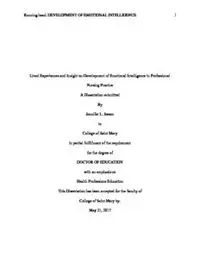
Jessen, Jennifer. Lived Experiences and Insight on Development of Emotional Intelligence in ... PDF
Preview Jessen, Jennifer. Lived Experiences and Insight on Development of Emotional Intelligence in ...
Running head: DEVELOPMENT OF EMOTIONAL INTELLIGENCE 1 Lived Experiences and Insight on Development of Emotional Intelligence in Professional Nursing Practice A Dissertation submitted By Jennifer L. Jessen to College of Saint Mary in partial fulfillment of the requirement for the degree of DOCTOR OF EDUCATION with an emphasis on Health Professions Education This Dissertation has been accepted for the faculty of College of Saint Mary by: May 21, 2017 DEVELOPMENT OF EMOTIONAL INTELLIGENCE 2 We hereby certify that this Dissertation, submitted by Jennifer Jessen, conforms to acceptable standards and fully fulfills the Dissertation requirements for the degree of Doctor of Education from College of Saint Mary M.J. Petersen, Ed.D. Chair Patricia Morin, Ph.D. Committee Member Joy Martin, Ph.D. Committee Member DEVELOPMENT OF EMOTIONAL INTELLIGENCE 3 Copyright © May 2017 Jennifer Jessen DEVELOPMENT OF EMOTIONAL INTELLIGENCE 4 DEDICATION This dissertation is dedicated to the health care professionals who have mentored me and countless others to becoming the nursing professionals we are today. Without their emphasis on caring, compassion, empathy, and grit many would have unnecessarily struggled to practice in a way that embodies the holistic nature of this profession. Those who practice with emotional intelligence reap many benefits, but those who teach emotional intelligence pass those benefits on to others. It is my sincere hope that the work of this research will honor those who have positively influenced the care of others. I would also like to dedicate this work to my children. May the values of empathy, compassion, and determination always remain a part of your lives, both personally and professionally. DEVELOPMENT OF EMOTIONAL INTELLIGENCE 5 ACKNOWLEDGEMENTS This dissertation was only made possible with the consistent support and prodding of many accomplished people in my life. Without their belief in my abilities I would not have persisted in this endeavor. I would like to especially thank Dr. MJ Petersen not only for serving in the arduous task of being my dissertation chair, but believing that I would be worthy of teaching and starting me on this path long ago. Many thanks to Dr. Patricia Morin and Dr. Joy Martin for their extensive support which went beyond the expectations of serving on my committee. Dr. Lois Linden also has my sincere gratitude for her help in guiding me to this finished project. My research subject, Kay, has my appreciation for agreeing to let me into her home and sharing all the details of her nursing history. I am forever grateful for your generosity. I would also like to thank my parents and siblings for their unwavering support during the years in completing my graduate education. The many days and nights helping watch my two young children so that I could research and write were invaluable to reaching graduation. My mother especially deserves my gratitude, as she has never once doubted what I was capable of accomplishing. Thank you, Mom, for always thinking my work was perfect (when I assure you it wasn’t). Lastly, thank you to Jake and Max. You have only known your mother as a student and I am sorry for all the babysitters when I had class, the nights spent eating reheated food, and the days your mother lost patience when she should have had more. Thank you for never once complaining about the time you spent at the library. Thank you for tolerating the conference calls and group study dates. Thank you for always being proud of me; I would not be here if it were not for you. DEVELOPMENT OF EMOTIONAL INTELLIGENCE 6 Table of Contents ABSTRACT………………………………………………...……………………………………14 CHAPTER I: INTRODUCTION………………….………………...………..…………………15 Background……………………………………….…….………..…………….………...16 Statement of Problem………….………………..………………...…………...…………17 Purpose of the Study……………………….………...………………………..…………18 Significance of the Study..………...…………………………………………..…………19 Research Questions……………………………………………………………………....19 Definitions…………………………………………….……………….…………………20 Assumptions ………………………………….……………………………………….…21 Limitations…………………………………….……...…….……………………………21 Delimitations…………………………………...…………….………………...………...22 Summary……………………………………………..…………………..………………23 CHAPTER II: LITERATURE REVIEW…...……………………..…………………………….25 Theoretical Framework…………………………………………………………………..25 Models of Emotional Intelligence……………..…………………………………………26 Ability Model of Emotional Intelligence……………...…………………………26 Mixed Model of Emotional Intelligence……………..…………………………27 Measurement of Emotional Intelligence…………………………………………………29 Performance Measures……………………………………………………...……29 Self Report Measures……………………………………….……………30 General Discussion of EI Measurement…………………………………………………32 Four Branches of Emotional Intelligence……………………..…………………………33 DEVELOPMENT OF EMOTIONAL INTELLIGENCE 7 Perceiving Emotions………………………………………..……………………34 Patient Safety…………………………………...….…………………….34 Using Emotions………………………………………………..…………………35 Interpersonal Communication……………………………………………35 Teamwork…………………………………………………..……………36 Understanding Emotions…………………………………………………………37 Empathy and Compassion………………………………………..………37 Managing Emotions…………………………………………………………...…38 Stress Management and Burnout Prevention………………………….…39 Retention and Organizational Commitment…………………………..…40 Factors Influencing Emotional Intelligence Development………………………………41 Gender……………………………………………………………………………41 Age and Experience…………………………………………………………...…42 Instruction……………………………………………………………………..…43 Role Play and Simulation……………………………………………..…44 Reflection Practices…………………………………………………...…45 Role Modeling and Mentorship…..…………………………………...…46 Summary.………………………………………………………………………………...47 CHAPTER III: METHODOLOGY……...………………………………………………………49 Research Design…………………………………….……………………………………49 Study Participants………………………………………..………………………………50 Sampling Procedures and Size…………………………………...………………………51 Setting for Data Collection………………………………………………………………51 DEVELOPMENT OF EMOTIONAL INTELLIGENCE 8 Ethical Considerations………………………………………………...…………………52 IRB Approval………………………………………………………….…………52 Informed Consent…………………………………………………………...……52 Confidentiality Procedures……………………………….………………………53 Data Collection Procedures………………………………………………………………54 Participant Recruitment……………………………………………….…………54 Data Collection Instruments…………………………………………..…………55 MSCEIT…………………………………………………………….……55 Interviews………………………………………………………………...56 Phase One Interviewing…………………………….……………56 Phase Two Interviewing…………………………………………57 Phase Three Interviewing………………………..………………57 Journals………………………………………………………………..…58 Data Analysis Plan………………………………………………….……………………58 Thematic Analysis…………………………………………….…………………59 Structural Analysis……………………………………………….………………60 Data Quality Assurance………………………………………………….………………61 EI Validation…………………………………………………….……….………62 Investigator Bias…………………………………………………………………62 Triangulation…………………………….…………….…………………………62 Member Checking……………………………….……….………………………62 Summary…………………………………………………………………………………63 CHAPTER IV: RESULTS……..………………………………………...………………………64 DEVELOPMENT OF EMOTIONAL INTELLIGENCE 9 Introduction………………………………………………………………………………64 Research Participant………………….…………………………………………………..64 General Disposition…………..………………………………………………….66 Nursing Experiences…………..…………………………………………………66 Support Systems…………………………………………………………………70 Beliefs Regarding EI……………….……………………………………………71 MSCEIT Testing Results……………..….………………………………………72 Data Analysis…………………………………….………………………………………73 Evidence of EI……………………………………………………………………74 Perceiving Emotions………………..……………………………………74 Using Emotions………………………..…………………………………75 Understanding Emotions…………………………………………………78 Managing Emotions………………………..…………………………….79 Concepts Analysis Results…………………………….…………………………80 Formal Teaching…………………………………………………………81 Mentorships………………………………………………………………82 Experience………….……………………………….……………………85 Clinical Empathy………...………………………………………………86 Innate Ability……….……………………………………………89 Reflection………………………...………………………………………90 Self-talk……………………..……………………………………92 Structural Analysis Results………………………………………………………93 Major Themes……………………………………………………………97 DEVELOPMENT OF EMOTIONAL INTELLIGENCE 10 Comparison of Analysis Types…..………………………………………99 Summary………………………………………….………………………………….…102 CHAPTER V: IMPLICATIONS…...……………………...…………...………………………104 Discussion & Summary…………………………………………...……………………104 Research Question #1…………………………………………......……………………105 Research Question #2……………………………………...…………..….……………111 Correlation to Literature ……………………………………...…………..……………115 Recommendations……………………………………...…………………………….…122 Limitations………………………………………………………...……………………127 Delimitations……………………………………….……………...……………………127 Future Research…………………………………………………...……………………128 Summary……………………………………...……………………………………...…129 REFERENCES…………………………………………………………………………………131 APPENDICES………………………………………………….………………………………143 Appendix A: Institutional Review Board Approval……………………………………143 Appendix B: Emotional Intelligence in Nursing Article……..…………..…………….144 Appendix C: The Rights of Research Participants………………..…………...……….150 Appendix D: Informed Consent ……………………………………..…………………151 Appendix E: Recruitment Email…………………………..……………………...…….154 Appendix F: Life Grid & Journal Instructions……...……..…………………………....158 Appendix G: Audit Trail Letter………………………………………………………...159
